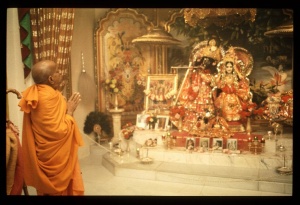SB 10.74.37

A.C. Bhaktivedanta Swami Prabhupada
TEXT 37
brahmarṣi-sevitān deśān
hitvaite 'brahma-varcasam
samudraṁ durgam āśritya
bādhante dasyavaḥ prajāḥ
SYNONYMS
brahma-ṛṣi—by great brāhmaṇa sages; sevitān—graced; deśān—lands (like Mathurā); hitvā—abandoning; ete—these (Yādavas); abrahma-varcasam—where brahminical principles are not observed; samudram—the ocean; durgam—a fortress; āśritya—taking shelter of; bādhante—they cause trouble; dasyavaḥ—thieves; prajāḥ—to their subjects.
TRANSLATION
These Yādavas have abandoned the holy lands inhabited by saintly sages and have instead taken shelter of a fortress in the sea, a place where no brahminical principles are observed. There, just like thieves, they harass their subjects.
PURPORT
The words brahmarṣi-sevitān deśān ("holy lands inhabited by saintly sages") allude to the district of Mathurā. Śrīla Prabhupāda writes, "Śiśupāla went crazy because of Kṛṣṇa's being elected the supreme, first worshiped person in that meeting, and he spoke so irresponsibly that it appeared that he had lost all his good fortune."